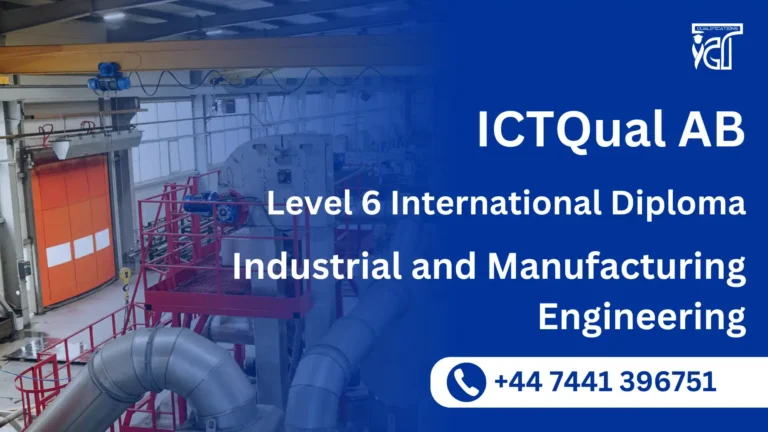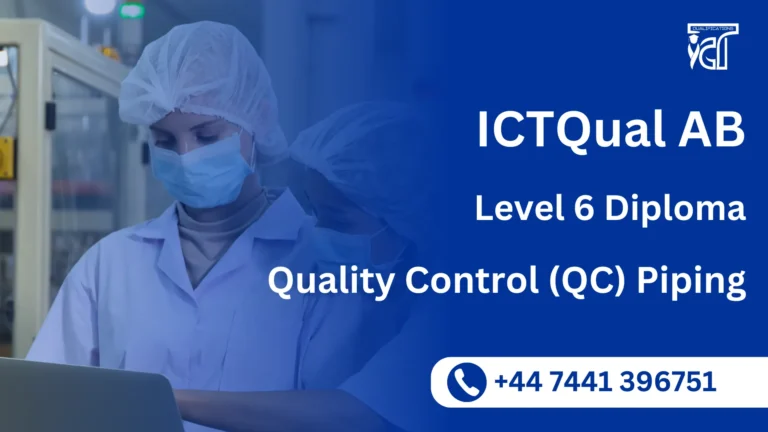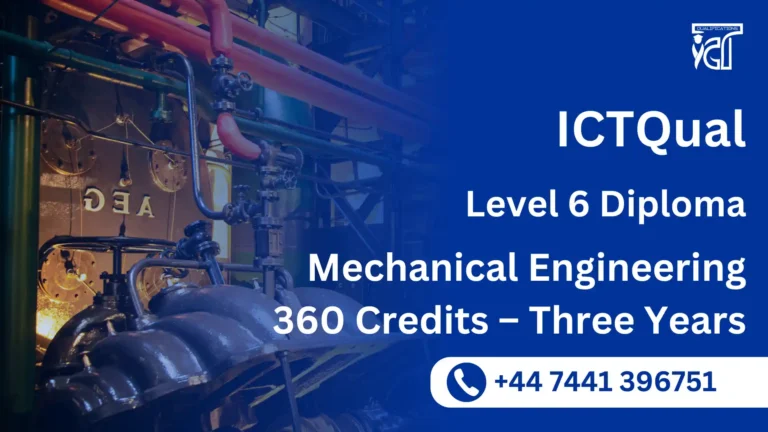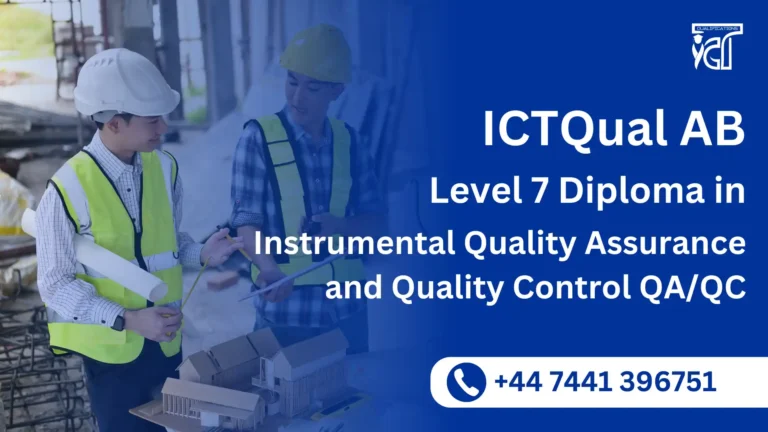The ProQual Level 6 Diploma in Quality Control and Quality Assurance (QA/QC) – Engineering is a prestigious, Ofqual‑regulated qualification designed to empower engineering professionals with advanced expertise in quality systems and strategic process management. This UK‑recognized diploma delivers a thorough grounding in key QA/QC frameworks including ISO 9001 compliance, risk mitigation, statistical process control, auditing, and quality management systems tailored to engineering contexts. It bridges technical knowledge with leadership skills—preparing you to implement robust quality strategies across civil, mechanical, and electrical engineering projects.
Structured around five core units, this course covers principles of QA/QC, quality systems and standards, and discipline‑specific methodologies for civil, mechanical, and electrical engineering environments. With a total qualification time of approximately 600 hours (300 guided learning hours), it’s delivered through flexible, assignment‑based assessment ideal for working professionals balancing education with career demands.
Ideal for engineers, project managers, QA/QC officers, and technical inspectors, the diploma equips learners to drive excellence in product quality, process reliability, and regulatory compliance. Whether you’re seeking to transition into QA/QC roles or elevate your current position, this qualification strengthens your professional credibility, enhances operational impact, and unlocks career advancements in engineering and quality management sectors worldwide.
ProQual Level 6 Diploma in Quality Control and Quality Assurance (QA/QC) – Engineering
The ProQual Level 6 Diploma inQuality Control and QualityAssurance (QA/QC) – Engineering, to achieve the qualification candidates must must complete the all mandatory units of Total Qualification Time (TQT): 600 Hours, Guided Learning Hours (GLH): 300 Hours and 60 credits
| Sr# | Unit Title | credit | GLH | TQT |
|---|---|---|---|---|
| 1 | Principles of Quality Control and Quality Assurance | 12 | 60 | 120 |
| 2 | Quality Management Systems and Standards | 12 | 60 | 120 |
| 3 | Quality Control & Quality Assurance in Civil Engineering Projects | 12 | 60 | 120 |
| 4 | Quality Control & Quality Assurance in Mechanical Field Activities and Systems | 12 | 60 | 120 |
| 5 | Quality Control & Quality Assurance in Electrical Systems | 12 | 60 | 120 |
GLH (Guided Learning Hours) and TQT (Total Qualification Time) are terms commonly used in vocational qualifications to help define the amount of time a learner is expected to spend on their studies.
1. GLH (Guided Learning Hours)
GLH refers to the number of hours a learner spends being directly taught, supervised, or supported during their course. This includes the time spent in activities such as:
- Classroom instruction
- Practical workshops
- One-on-one tutoring or mentoring sessions
- Online learning sessions with tutor support
In other words, GLH represents the time that learners are actively engaged with their instructors or learning activities.
2. TQT (Total Qualification Time)
TQT represents the total amount of time a learner is expected to invest in completing a qualification, including:
- GLH (Guided Learning Hours): Time spent on direct learning, as explained above.
- Self-Directed Learning: This includes time spent on independent study, research, assignment completion, preparation for exams, and any other work the learner does outside of direct teaching hours.
TQT is a broader measure that includes all the time required to achieve the qualification. It helps learners and employers understand the overall commitment required for the qualification.
Key Differences Between GLH and TQT:
- GLH focuses on direct learning with guidance or supervision.
- TQT includes GLH as well as independent study time and other learning-related activities.
Example:
If a qualification has a TQT of 600 hours and a GLH of 250 hours, it means the learner should spend 250 hours in direct learning (classroom, online, or tutor-led sessions) and 350 hours on independent study or research.
ProQual Level 6 Diploma in Quality Control and Quality Assurance (QA/QC) – Engineering
Principles of Quality Control and Quality Assurance
- Understand the principles of Quality Control (QC) and Quality Assurance (QA)
- Evaluate the importance of quality standards and regulations.
- Examine the quality assurance lifecycle.
- Understand risk management in QA/QC
Quality Management Systems and Standards
- Understand Quality Management Systems (QMS).
- Understand international quality standards to QMS.
- understand continuous improvement strategies.
- Evaluate performance measurement techniques for QMS.
Quality Control & Quality Assurance in Civil Engineering Project
- Understand the application of QA/QC in Civil Engineering.
- Design quality assurance processes in civil engineering projects.
- Understand how to monitor and evaluate construction materials for quality.
- Understand regulatory standards for civil engineering QA/QC.
Quality Control & Quality Assurance in Mechanical Field Activities and Systems
- Understand the role of QA/QC in mechanical engineering systems.
- Understand testing and calibration techniques in mechanical systems
- Evaluate mechanical system performance under QA/QC standards.
- Assess safety and environmental impacts in mechanical QA/QC
Quality Control & Quality Assurance in Electrical Systems
- Understand QA/QC principles in electrical systems
- Understand electrical system testing for quality assurance.
- Monitor and evaluate risk management processes in QA/QC.
- Understand regulatory compliance in electrical QA/QC processes
Benefits of the ProQual Level 6 Diploma in Quality Control and Quality Assurance (QA/QC) – Engineering
- Ofqual Regulated and Globally Recognized
The ProQual Level 6 Diploma is an Ofqual-regulated qualification, ensuring it meets rigorous national standards and is recognized worldwide. This provides you with a qualification that holds significant value across global engineering industries, increasing your credibility and career opportunities. - Assignment-Based Learning for Flexibility
This diploma is entirely assignment-based, meaning there are no exams. This approach allows you to learn at your own pace and apply the knowledge directly to your work. It offers flexibility for working professionals, making it easier to balance your studies with your career commitments. - Career Advancement Opportunities
Upon completing the course, you will be equipped to pursue higher-level positions within the quality control and assurance fields, such as Quality Manager, QA/QC Lead, Compliance Officer, or Engineering Quality Consultant. The course provides the advanced skills required to lead quality initiatives in engineering projects and organizations. - Specialization in Engineering Quality Control and Assurance
The course focuses specifically on the engineering industry, addressing the unique challenges and requirements of QA/QC in sectors like manufacturing, construction, automotive, and construction. This industry-focused approach ensures that the qualification is directly relevant to professionals working within these fields. - Enhanced Skills in Risk Management and Problem Solving
You will develop essential skills in risk management, continuous improvement, and problem-solving—all critical competencies for managing quality in engineering projects. The course will teach you how to identify and mitigate risks, ensuring engineering projects are efficient, compliant, and deliver high-quality results. - Practical Application of Knowledge
The assignment-based structure enables you to apply what you learn directly to real-world situations, making the course highly practical. You’ll tackle industry-specific scenarios, allowing you to enhance quality standards and solve quality-related issues within your organization immediately. - Improved Regulatory Compliance and Auditing Skills
The course includes a deep dive into quality auditing and regulatory compliance, enabling you to ensure that engineering projects meet international standards and regulations. This is particularly valuable in highly regulated industries like pharmaceuticals, automotive, and construction, where compliance is critical. - Increased Earning Potential
Completing this Level 6 diploma can significantly increase your earning potential by opening doors to senior roles with higher salaries and greater responsibilities. As a recognized expert in QA/QC within engineering, you position yourself for more lucrative job opportunities in both local and international markets. - Development of Leadership and Management Skills
The course covers key topics related to managing quality teams and projects, helping you develop valuable leadership skills. This prepares you for leadership roles in quality management within engineering organizations, where you’ll be responsible for setting quality standards and leading continuous improvement initiatives. - Global Mobility and Industry Recognition
The ProQual Level 6 Diploma is recognized internationally, which gives you the flexibility to work in various regions and industries. Whether you plan to stay in the UK or work abroad, this qualification will help you stand out in the global job market. - Foundation for Further Study
Completing the ProQual Level 6 Diploma provides a solid foundation for pursuing advanced qualifications in quality management or engineering, such as Level 7 Diplomas, Six Sigma certifications, or Master’s degrees in relevant fields. This course offers you the opportunity to continue your education and expand your expertise further. - Competitive Edge in the Job Market
With an increasing demand for highly skilled quality professionals in engineering, this diploma equips you with the specialized knowledge needed to excel in the industry. By gaining advanced qualifications, you’ll differentiate yourself from other professionals and improve your employability in a competitive job market.
The ProQual Level 6 Diploma in Quality Control and Quality Assurance (QA/QC) is designed for experienced professionals who want to specialize or advance in quality control and assurance within the engineering industry. Here’s a look at who this course is best suited for:
- Quality Control and Quality Assurance Managers
If you are currently a Quality Manager, QA Manager, or QC Manager working in an engineering-related field, this course will help you refine your skills and move into senior leadership roles. It provides you with the advanced tools and knowledge to enhance quality standards and implement effective quality management systems (QMS) across engineering projects. - Engineering Professionals Looking to Specialize in QA/QC
Engineers with a background in manufacturing, construction, automotive, or other engineering sectors who are looking to specialize in quality control and assurance will benefit greatly from this qualification. The course will provide you with the skills necessary to apply advanced QA/QC principles in engineering-specific contexts. - Compliance Officers and Auditors in Engineering
Professionals responsible for regulatory compliance and quality auditing in engineering projects will find this course highly valuable. The course covers essential topics like auditing techniques, compliance with industry standards, and risk management—key skills for ensuring quality and regulatory compliance within engineering environments. - Engineering Project Managers
If you’re a Project Manager overseeing engineering projects, this course will equip you with the knowledge and tools to integrate quality management processes seamlessly into your projects. The course covers topics like risk management, continuous improvement, and quality systems implementation, which are critical for managing large-scale engineering projects. - Senior Engineers Seeking Leadership Roles
Engineers who are looking to move into leadership roles within engineering quality management will benefit from this qualification. The course focuses on leadership skills, quality assurance systems, and risk management, helping you prepare for higher-level responsibilities and a more strategic role in quality management. - Quality Consultants in the Engineering Sector
For individuals working as quality consultants or in roles related to quality improvement, this course will provide you with advanced knowledge in quality control and assurance practices specific to the engineering industry. It helps you stay ahead of industry trends and enhances your ability to guide organizations through quality audits and system improvements. - Regulatory and Standards Professionals
If you work in roles that require you to understand and implement industry regulations and engineering standards, this diploma will provide the knowledge to help you maintain compliance in highly regulated industries, such as pharmaceuticals, automotive, construction, and aerospace. - Aspiring Senior Leaders in QA/QC
For those aiming to step into senior roles such as Head of Quality, Director of Quality Assurance, or QA/QC Lead, this diploma offers the necessary expertise to take on high-level decision-making and quality strategy responsibilities within engineering organizations.
Future Progression After Completing the ProQual Level 6 Diploma in Quality Control and Quality Assurance (QA/QC) – Engineering
- Advance into Senior Quality Roles in Engineering
- Open doors to positions such as:
- QA/QC Engineer
- Quality Assurance Manager
- Project Quality Lead
- Quality Systems Auditor
- Engineering Quality Consultant
- Open doors to positions such as:
- Enhance Your Global Employability
- Recognized across international markets including the UK, Middle East, Africa, and Asia.
- Ideal for roles in sectors such as oil & gas, construction, energy, manufacturing, and infrastructure development.
- Gain Eligibility for Professional Memberships
- Supports applications to industry-recognized institutions such as:
- CQI (Chartered Quality Institute)
- ICQA (International Certification for Quality Auditors)
- Supports applications to industry-recognized institutions such as:
- Pursue Further Academic and Technical Qualifications
- Boost Career Transition to Leadership or Consultancy
- Equip yourself to take on consulting roles or move into strategic quality leadership at project and corporate levels.
- Drive Quality Excellence Across Projects and Organizations
- Develop the capability to lead audits, implement ISO-compliant systems, reduce defects, and improve customer satisfaction.
- Support Continuous Professional Development (CPD)
- Aligned with CPD goals, helping you stay updated with modern QA/QC practices and global quality standards.
Entry Requirements
Register Now
Qualification Process
Qualification Process for the ProQual Level 6 Diploma in Quality Control and Quality Assurance (QA/QC)
- Self-Assessment:
Begin by evaluating your eligibility to ensure you meet the qualification requirements, including work experience, knowledge, and language proficiency. - Registration:
Complete your registration by submitting the required documents, including a scanned copy of a valid ID, and paying the registration fee. - Induction:
An assessor will conduct an induction to confirm your eligibility for the course and explain the evidence requirements. If you do not meet the criteria, your registration will be canceled, and the fee will be refunded. - Assignmnets & Evidence Submission:
Provide all assignmnets and the necessary evidence based on the assessment criteria outlined in the course. If you are unsure of the required evidence, consult with the assessor for guidance on the type and nature of evidence needed. - Feedback and Revision:
The assessor will review your submitted evidence and provide feedback. Evidence that meets the criteria will be marked as “Criteria Met,” while any gaps will be identified. You will be asked to revise and resubmit if needed. - Competence Evidence:
Submit final evidence demonstrating that all learning outcomes have been met. This evidence will be marked as “Criteria Met” by the assessor once it is satisfactory. - Internal Quality Assurance (IQA):
The Internal Quality Assurance Verifier (IQA) will review your evidence to ensure consistency, quality, and compliance with standards. - External Verification:
The IQA will submit your portfolio to ProQual’s External Quality Assurance Verifiers (EQA) for final confirmation. The EQA may contact you directly to verify the authenticity of your evidence. - Certification:
Upon successful completion of all checks, ProQual will issue your official certificate, confirming that you have attained the ProQual Level 6 Diploma in Quality Control and Quality Assurance (QA/QC).
FAQs for ProQual Level 6 Diploma in Quality Control and Quality Assurance (QA/QC) – Engineering







